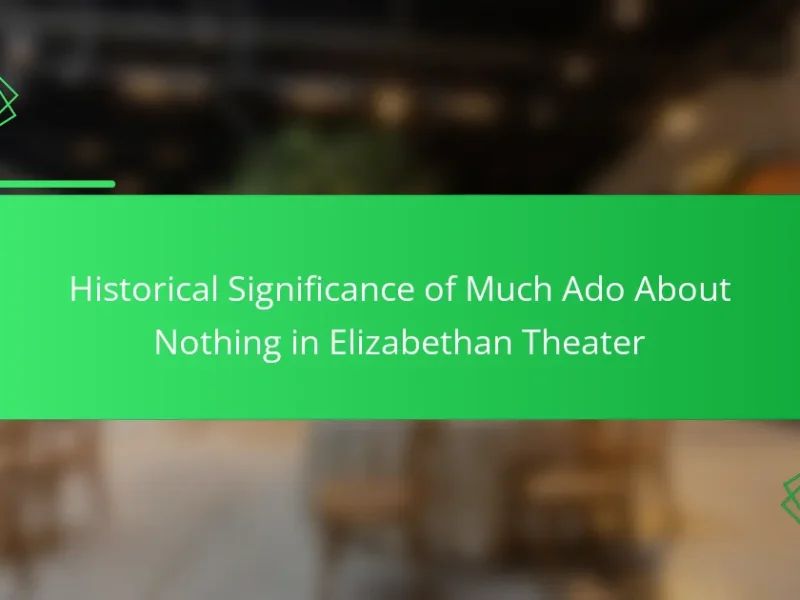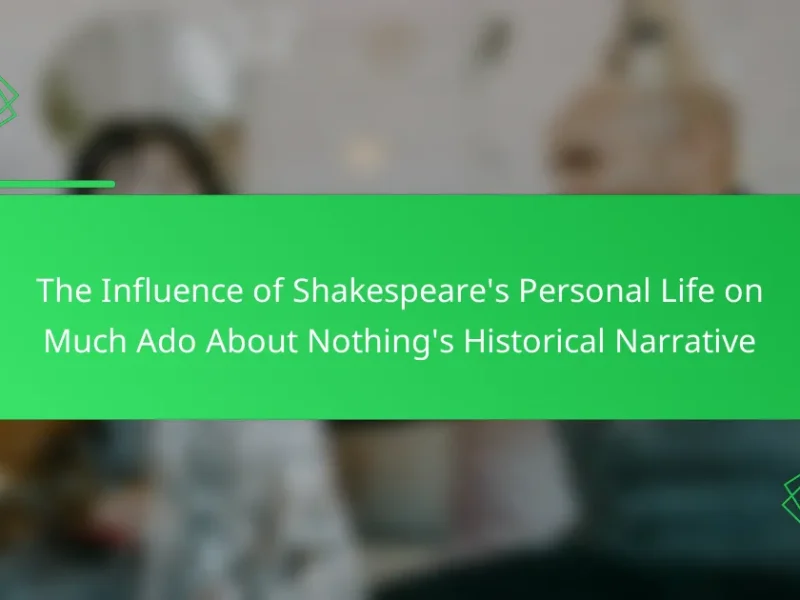
How does the political climate influence the themes in Much Ado About Nothing?
The political climate significantly influences the themes in Much Ado About Nothing. The play is set in a society governed by strict social hierarchies and expectations. Issues of honor, reputation, and power dynamics are central to the narrative. The political environment creates tension between characters, particularly regarding marriage and fidelity. For instance, Claudio’s public shaming of Hero reflects societal pressures and the consequences of political alliances. Additionally, the presence of authority figures, like Don Pedro, shapes the characters’ actions and motivations. The interplay of personal relationships and political intrigue highlights the fragility of social standing. This context underscores the importance of perception and the impact of gossip in a politically charged atmosphere.
What are the key themes in Much Ado About Nothing?
The key themes in Much Ado About Nothing include love, deception, and honor. Love is portrayed through the relationships of Benedick and Beatrice, as well as Claudio and Hero. Deception plays a crucial role, as characters use tricks to manipulate others’ perceptions. Honor, particularly regarding women’s reputation, is a central concern, exemplified by Hero’s public shaming. The interplay of these themes reflects societal norms of the time, particularly in relation to gender roles and social expectations. The political climate influences these themes, as the characters navigate a world where reputation and honor are paramount.
How do love and deception manifest within the political context?
Love and deception manifest in the political context through manipulation and betrayal. Political leaders often use love as a tool to gain support or loyalty. Deception can arise when promises of affection are insincere. Historical examples include political marriages that served to unite factions rather than genuine love. In Shakespeare’s “Much Ado About Nothing,” characters deceive each other to achieve political ends. Claudio’s public shaming of Hero illustrates how love can be weaponized. The political climate influences personal relationships, leading to mistrust and conflict. This interplay highlights the complexities of human emotions in governance.
In what ways does honor and reputation reflect the political climate?
Honor and reputation significantly reflect the political climate by influencing social interactions and power dynamics. In politically charged environments, individuals often prioritize their honor to maintain status and influence. For example, in “Much Ado About Nothing,” characters like Claudio and Don Pedro navigate their reputations carefully, as public perception impacts their relationships and decisions. The societal expectations of honor dictate their actions, showcasing how reputation can sway political allegiances. Historical contexts reveal that in times of political unrest, individuals may act to protect their honor to secure their positions. Thus, honor and reputation serve as crucial indicators of the prevailing political atmosphere.
Why is the political backdrop significant for character development?
The political backdrop is significant for character development because it shapes characters’ motivations and actions. In “Much Ado About Nothing,” the political climate affects social hierarchies and personal relationships. Characters like Claudio and Benedick are influenced by societal expectations tied to their political environment. The tension between honor and reputation plays a crucial role in their decisions. For instance, Claudio’s public shaming of Hero reflects the political importance placed on female virtue. Additionally, the influence of authority figures like Don Pedro drives conflict and resolution among characters. This interplay between politics and personal dynamics enriches the narrative and deepens character arcs.
How do characters like Benedick and Beatrice respond to political pressures?
Benedick and Beatrice respond to political pressures with skepticism and resistance. They often challenge societal norms and expectations. Benedick initially conforms to the pressures of masculinity and honor. However, he later prioritizes his feelings for Beatrice over political expectations. Beatrice displays a strong sense of independence. She openly critiques the patriarchal structures around her. Both characters navigate their relationship amidst the political backdrop of honor and reputation. Their responses highlight the tension between personal desires and societal demands. This dynamic illustrates the broader themes of individual agency in Much Ado About Nothing.
What role does authority play in shaping character motivations?
Authority significantly influences character motivations in “Much Ado About Nothing.” Characters often act based on their perceptions of authority figures. For instance, Don Pedro’s status drives others to seek his approval. Claudio’s motivations are shaped by his desire to align with Don Pedro’s expectations. Moreover, Beatrice’s defiance against patriarchal authority highlights her struggle for autonomy. The political climate, represented by authority, creates tension and conflict among characters. This dynamic is evident in the way characters respond to societal norms dictated by their leaders. Ultimately, authority serves as a catalyst for character actions and decisions throughout the play.

What specific aspects of the political climate are present in Much Ado About Nothing?
Much Ado About Nothing reflects aspects of the political climate through themes of honor, reputation, and social hierarchy. The characters are influenced by the expectations of a patriarchal society. Honor is a crucial element, as seen in Claudio’s public shaming of Hero. This act demonstrates the importance placed on female virtue and male honor. The political backdrop of war also affects interpersonal relationships, highlighting loyalty and betrayal. The play’s setting in Messina showcases the impact of local governance and authority. Characters navigate power dynamics, illustrating how political structures shape personal interactions. The tension between public perception and private truth is a recurring theme. Ultimately, the political climate shapes the characters’ motivations and conflicts throughout the narrative.
How does the Elizabethan political landscape influence the play?
The Elizabethan political landscape significantly influences the play “Much Ado About Nothing.” The era was marked by a strong monarchy under Queen Elizabeth I. This political stability allowed for the exploration of themes such as honor and reputation. Social hierarchy played a crucial role in character interactions. Characters like Claudio and Benedick reflect societal expectations of masculinity and honor. The play critiques these expectations through its comedic elements. Political alliances and family ties are central to the plot. The influence of courtly life shapes character motivations and conflicts. Overall, the political climate informs the play’s examination of social norms and personal relationships.
What historical events parallel the themes in Much Ado About Nothing?
The historical events that parallel the themes in Much Ado About Nothing include the political tensions of the late 16th century in England. This period saw the rise of court intrigue and social stratification, which are central themes in the play. The Elizabethan era was marked by issues of honor, reputation, and the complexities of love, mirroring the relationships between characters like Benedick and Beatrice. Additionally, the conflict between social classes and the importance of marriage alliances reflect the societal norms of the time. The political climate fostered a culture of deception and misunderstanding, evident in the play’s plot twists. Events such as the Spanish Armada’s threat in 1588 heightened national anxieties, influencing the play’s exploration of loyalty and betrayal. These historical contexts provide a backdrop that enriches the play’s themes and character dynamics.
How does the concept of power dynamics appear in the characters’ interactions?
Power dynamics in “Much Ado About Nothing” manifest through the relationships and interactions among characters. The characters exhibit varying degrees of authority and influence, shaping their decisions and behaviors. For instance, Don Pedro wields significant power as a prince, impacting the fates of others. His decisions dictate the romantic pursuits of Claudio and Benedick. Conversely, characters like Beatrice and Hero navigate their societal roles, often constrained by patriarchal expectations. Claudio’s public shaming of Hero highlights the severe consequences of power imbalances. Additionally, manipulation occurs, as seen when Don John exploits others’ vulnerabilities. The interplay of these dynamics illustrates how social hierarchies and personal motives drive the narrative forward.
What role does social hierarchy play in the political context of the play?
Social hierarchy significantly influences the political context of the play. It establishes power dynamics among characters. Higher social status often correlates with greater political influence. Characters like Don Pedro wield authority due to their noble lineage. This hierarchy impacts relationships and decisions throughout the narrative. For instance, class distinctions affect how characters perceive honor and reputation. The play showcases the consequences of social standing on personal and political interactions. Thus, social hierarchy serves as a critical framework for understanding power and conflict in the story.
How do class distinctions affect character relationships?
Class distinctions significantly influence character relationships in “Much Ado About Nothing.” The characters’ social standings dictate their interactions and perceptions of one another. For instance, higher-status characters like Don Pedro and Claudio often exhibit authority and expect deference from lower-status characters such as Dogberry. This hierarchy creates tension and misunderstandings, particularly in romantic pursuits. The relationship between Beatrice and Benedick illustrates how class can complicate personal connections. Their witty banter often masks deeper societal expectations. Additionally, the play critiques these class distinctions, highlighting the absurdity of rigid social roles. The impact of class is evident in how characters navigate love, honor, and loyalty, shaping their fates throughout the narrative.
What implications does social standing have on the plot’s outcomes?
Social standing significantly influences the outcomes of the plot in “Much Ado About Nothing.” Characters’ social status determines their power, influence, and the way they are treated. Higher social standing often leads to greater authority and respect, affecting decisions and relationships. For example, characters like Don Pedro and Claudio wield significant power due to their noble status. Their actions, such as Claudio’s public shaming of Hero, have profound consequences on the plot. Conversely, characters of lower social standing, like Dogberry, are often marginalized and their contributions overlooked. This disparity highlights the impact of social hierarchy on justice and resolution within the narrative. Ultimately, social standing shapes the dynamics of love, honor, and conflict in the play.

How do the themes and characters in Much Ado About Nothing resonate with contemporary political issues?
The themes and characters in Much Ado About Nothing resonate with contemporary political issues through their exploration of power dynamics and social expectations. The play highlights the influence of gossip and public perception, which parallels today’s media-driven political landscape. Characters like Don John represent the disruptive forces that challenge societal norms, echoing modern political dissent. Additionally, the romantic misunderstandings reflect how miscommunication can lead to political strife. The emphasis on honor and reputation in the play mirrors current debates about integrity in leadership. These elements showcase the timeless nature of Shakespeare’s commentary on human behavior and its implications in a political context.
What modern parallels can be drawn from the play’s political themes?
Modern parallels to the political themes in “Much Ado About Nothing” include issues of misinformation and public perception. The play illustrates how rumors can shape reputations and influence societal behavior. Today, similar dynamics occur through social media and news outlets. Misinformation can lead to public outrage and division, mirroring the chaos in the play. Additionally, the themes of power dynamics and gender roles resonate in contemporary discussions about equality and representation. Both contexts reveal how political climates can affect personal relationships and societal norms. The enduring relevance of these themes highlights the play’s commentary on human behavior and societal structures.
How can the exploration of love and conflict inform current political discourse?
The exploration of love and conflict can significantly inform current political discourse by highlighting the complexities of human relationships in times of strife. Love often serves as a unifying force, promoting empathy and understanding among individuals. In contrast, conflict can expose underlying tensions and divisions within society. Historical examples, such as the Civil Rights Movement, illustrate how love for justice and equality fueled political change amidst conflict. Additionally, literature like Shakespeare’s “Much Ado About Nothing” reflects these themes, showing how personal relationships influence broader societal issues. By analyzing these dynamics, political discourse can become more nuanced, addressing both emotional and rational aspects of human behavior.
In what ways do the characters’ struggles reflect today’s societal challenges?
The characters’ struggles in “Much Ado About Nothing” reflect today’s societal challenges through themes of deception, gender roles, and social reputation. Deception plays a critical role in the characters’ interactions, mirroring contemporary issues of misinformation and trust. For example, the manipulation of truth leads to misunderstandings, similar to how misinformation affects public perception today. Gender roles are another significant aspect, as characters face societal expectations that limit their agency. This reflects ongoing discussions about gender equality and empowerment in modern society. Additionally, the importance of social reputation in the play parallels today’s challenges with public image and social media scrutiny. Characters are often judged based on appearances rather than their true character, highlighting the impact of societal pressure on personal identity. Overall, these struggles resonate with current societal issues, illustrating the timeless nature of the play’s themes.
What insights can be gained from analyzing the political climate in Much Ado About Nothing?
Analyzing the political climate in Much Ado About Nothing reveals insights into power dynamics and social hierarchies. The play reflects the tension between public duty and private desire. Characters navigate societal expectations, influencing their relationships and actions. For example, Claudio’s public shame of Hero highlights the consequences of reputation in a patriarchal society. Additionally, the political backdrop shapes the characters’ motivations and conflicts. The play critiques the impact of honor and integrity on personal relationships. Ultimately, understanding the political context deepens the appreciation of its themes and character development.
How can understanding the political context enhance the appreciation of the play?
Understanding the political context enhances appreciation of the play by revealing underlying themes and character motivations. The political climate during Shakespeare’s time influenced societal norms and expectations. For instance, the tension between social hierarchy and individual desires shapes characters like Benedick and Beatrice. Their witty banter reflects the era’s views on courtship and marriage. Additionally, the play’s exploration of honor and reputation is rooted in the political structures of the time. Events within the play mirror real political conflicts, such as the struggle for power and loyalty. This connection deepens the audience’s engagement and comprehension of the characters’ struggles. Recognizing these elements allows for a richer interpretation of the narrative and its relevance to contemporary issues.
What lessons can contemporary audiences learn from the interplay of politics and personal relationships in the play?
Contemporary audiences can learn that personal relationships are often influenced by political dynamics. In “Much Ado About Nothing,” the characters’ interactions reflect how societal norms shape individual behavior. The tension between public duty and private desire illustrates the struggle between personal happiness and social expectations. For example, Claudio’s public shaming of Hero highlights the consequences of political pressures on personal relationships. Additionally, the manipulation of information by figures like Don John shows how deceit can disrupt trust. These themes resonate today, reminding audiences of the impact of external forces on personal connections. Understanding this interplay can foster awareness of how contemporary politics affects interpersonal relationships.
The main entity of the article is “Much Ado About Nothing,” a play by William Shakespeare. The article explores how the political climate influences the play’s themes and characters, focusing on aspects such as honor, reputation, social hierarchy, and the interplay of love and deception. It examines how societal expectations shape character motivations and relationships, particularly in the context of a patriarchal society. Additionally, the article draws parallels between the play’s political themes and contemporary issues, highlighting the relevance of Shakespeare’s work in understanding the complexities of human behavior within a political framework.


